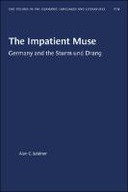Explore

Far from being a forerunner of Weimar Classicism or an addendum to the Enlightenment, the Sturm und Drang is best seen as part of an autonomous culture of impatience—as literature in which Germans, frustrated with their fragmented land, simulated a sense of power and effectiveness that political realities did not afford. This impatience drove not only authors and the characters they created; it also drew in German audiences and readers ready to partake vicariously in national sentiments that they otherwise could not have experienced. Alan Leidner sees Lavater's work as a model for dealing with a limiting culture, Goethe's Werther as a subtly arrogant figure, the drama of the "Kraftmensch" as a literature legitimizing the violence of its protagonists, the famous split in the "Urfaust" as the result of Goethe's resistance to the impatience that led many writers to fabricate a German nation that did not exist, and Schiller's "Die Räuber" as a liberating ritual that allowed German audiences to enjoy temporary feelings of national community. He concludes his study with an analysis of J. M. R. Lenz, whose texts recoil unequivocally in the face of the impatient muse.
This book is included in DOAB.
Why read this book? Have your say.
You must be logged in to comment.
Rights Information
Are you the author or publisher of this work? If so, you can claim it as yours by registering as an Unglue.it rights holder.Downloads
This work has been downloaded 23 times via unglue.it ebook links.
- 23 - pdf (CC BY-NC-ND) at OAPEN Library.
Keywords
- German studies
- Literature
- Literature & literary studies
- Literature: history & criticism
- thema EDItEUR::D Biography, Literature and Literary studies::D Biography, Literature and Literary studies::DS Literature: history and criticism
Links
DOI: 10.5149/9781469656731_LeidnerEditions

